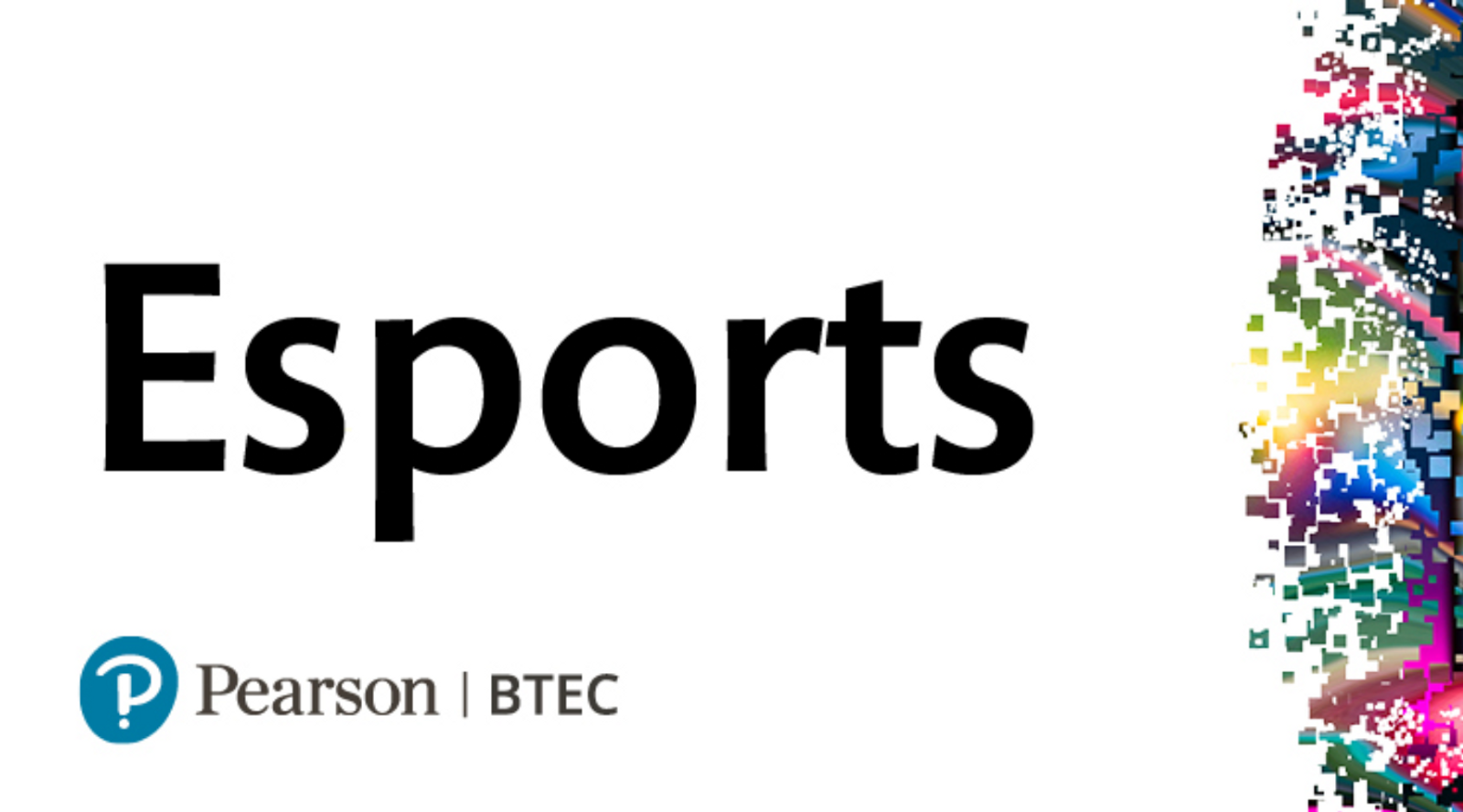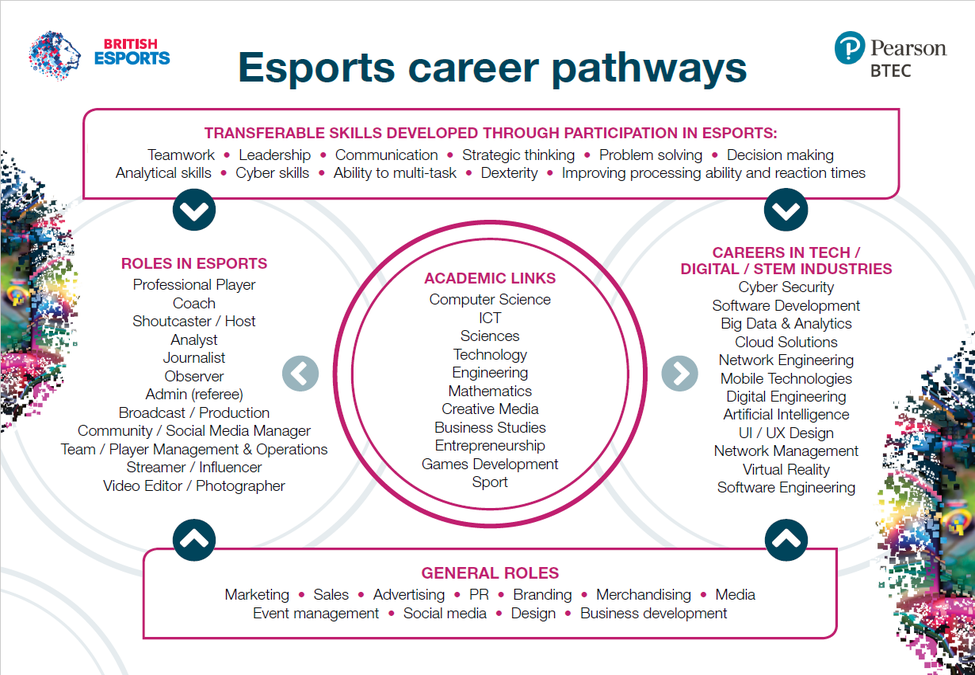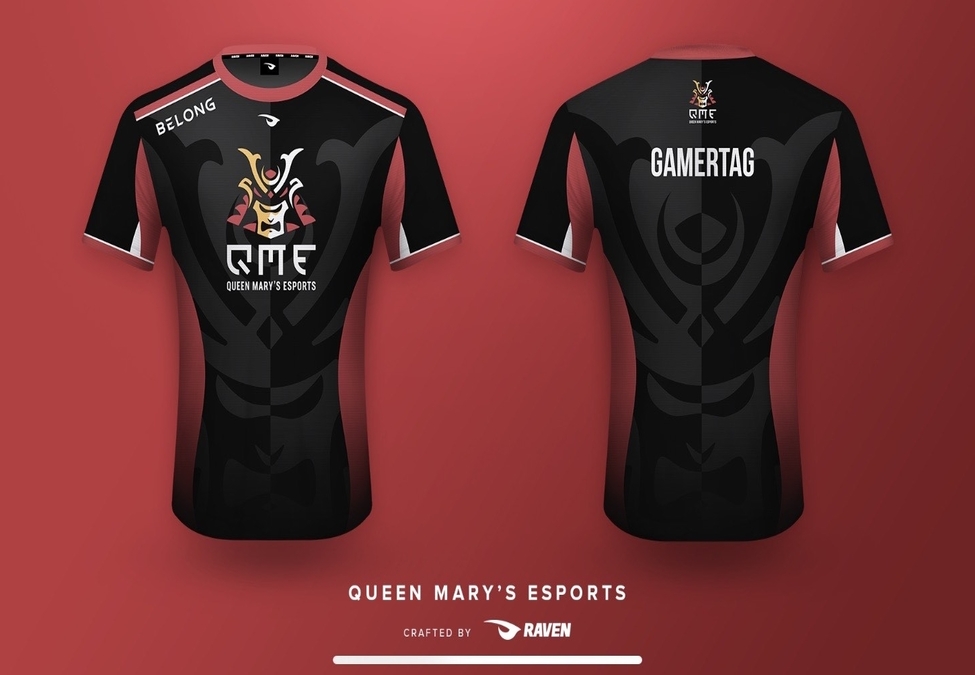In April, Pearson, an education publishing and assessment organisation, released a brand-new set of esports BTEC qualifications in collaboration with the British Esports Association.
As the qualifications hope to produce the next generation of esports enthusiasts with the skills and experience needed to get a job in the industry, we thought it would be worthwhile to examine the latest qualifications and speak with the people involved in their development and execution.

Qualification details
The four new Level 3 BTECs from Pearson and the British Esports Association are aimed at those in college and sixth form, typically aged between 16 and 18 years old. The main distinguishing feature between the different qualifications is their size and the number of guided learning hours that students receive.
When it comes to content, the qualifications include a blend of business, events, sports science, and marketing all themed around the world of esports. The specifications for all four qualifications set out four mandatory units that all students are required to study – these will introduce learners to the organisation of esports and traditional sport; require learners to create, pitch, and review a startup enterprise idea in the esports industry; explore how physical, social and psychological wellbeing affect the performance of esports players and research the best practices, skills, techniques and tactics of high performing teams.
[primis_video widget=”5183″]
Beyond these mandatory units, students who pick the larger qualifications will be able to choose from 13 or 15 other optional units. Some of the additional content focuses on parts of the industry that are inarguably essential to the ecosystem such as broadcasting, esports events, esports law and legislation, as well as the business applications of esports in social media. In an effort to complement the teaching material, the qualifications’ specification puts a lot of emphasis on the involvement of employers and organisations endemic to the esports industry.
Whilst many of the qualifications’ units seem relevant to esports, there are a few questionable sections. For example, one may challenge the appropriateness of the games design unit when few esports stakeholders are involved in the production of games, and this part of the wider gaming industry is typically unassociated with esports. Along with the mandatory “Health, Wellbeing and Fitness for Esports Players” unit, there is optional content concerning “Psychology for Esports Performance” and “Nutrition for Esports Performance.”
Whilst the holistic health of players is crucial, one might dispute that there is enough content across all three subjects, within the context of esports, to make up a total of 210 guided learning hours.

RELATED: Eastern Michigan University taps Gen.G for esports program
Many critics of esports in education question the experience of tutors delivering such qualifications. When I spoke to Tom Dore, Head of Education at the British Esports Association, about the competency of teachers delivering these qualifications, he explained that “the BEA are working with Pearson to create both teaching resources and training materials for teachers. We will also be reaching out again to the esports industry to support in the creation of the teaching resources, for example, through case studies of training, coaching, nutrition programmes or case studies of a successful social media campaign or a successful pitch for sponsorship and interviews with individuals in different roles within organisations”.
Towards the end of our chat, we asked for Dore’s opinion on why education should be a next step in the esports ecosystem, despite the industry having grown so quickly without it. He suggested that whilst experience will always be important, “as the esports industry continues to mature and grow in size and popularity, more entry routes will open up. These qualifications will offer a route in to people who perhaps haven’t had the right opportunity in the industry or don’t yet have the experience they want or need. They’re also qualifications that a student can put on their CV to help get a job or a career not just in esports, but in the wider gaming or digital or other industries.”
Queen Mary’s College
When researching the new qualifications, we were determined to get an insight from someone preparing to deliver them in the near future. We got in contact with James Fraser-Murison, Director of Learning and esports teacher-to-be at Queen Mary’s College in Basingstoke, and asked him about the college’s journey into esports and how it are looking to implement the new qualifications in its curriculum.
Fraser-Murison explained that after visiting the University of Chichester’s campus and learning of its esports degree, he launched an enrichment program and partnered with HP and HyperX to bring esports into Queen Mary’s College. More recently, he spoke with the BEA and Pearson and helped to frame the new qualifications in an academic setting. Now, ahead of the school year resuming in September, Fraser-Murison is preparing his college for the new qualifications as well as the continuation of its enrichment programme.
RELATED: Raven raises $1.4 million in seed funding round
Along with the aforementioned partners, Queen Mary’s College has secured a number of deals to support its new esports initiatives. UK esports apparel manufacturer Raven has created jerseys for the students who will be enrolling this year, and a collaboration with Vindex’s Belong Arenas will enable students to use the facilities for projects and private events.
With a few other exciting technology partnerships on the horizon, Fraser-Murison feels confident that there will be an exemplary level of industry involvement. When talking, he stressed the importance of these partnerships and specified that it’s “very important that [Queen Mary’s College] tie these relationships around the education side of things – we are going to use them for guest speakers, business models and case studies. Students will be able to get discounts on certain equipment, and they’re also going to help us launch a scholarship for students who have less money than others or those who particularly excel.”
When considering student life after college and the importance of industry experience, Fraser-Murison hopes that: “[the college’s partners] will also be able to provide us with certain work experience opportunities in the students’ second year and possibly provide a pathway for those students who don’t want to progress onto Chichester or Staffordshire University.”

Looking past this September, Fraser-Murison revealed some of the college’s longer-term plans when it comes to esports in education. He explained that once the qualifications were approved and embargoed in January, Queen Mary’s College placed “a £600,000 bid to create our very own esports floor which will be a first within education we believe – certainly at a sixth form level – so that we can go ahead with being the leading esports BTEC provider in the South of England.” He went on to describe how such a facility would aim to provide students with all the equipment and space needed to deliver events and other projects listed in the qualifications’ specification.
The verdict
Whilst the new qualifications have a few question marks around them, they do appear to be well-rounded and embrace different and important aspects of the industry like broadcasting, events, marketing, and business. One can hope that with the appropriate teaching resources and engagement from industry, tutors will be able to deliver the qualifications to a reasonable standard and do the BEA’s work on the new qualifications some justice.
Despite having little professional experience in esports, it’s great to see Fraser-Murison and the staff at Queen Mary’s College are approaching the new qualifications with enthusiasm. Hopefully, with industry involvement and the framework provided by the qualifications themselves, he will be able to support the next generation of esports professionals on their journey into the industry. If its plans are approved, the college’s esports floor will double-down on Queen Mary’s commitment to esports in education and, hopefully, raise the bar for other institutions to follow suit.
[maxbutton id=”4″ ]
